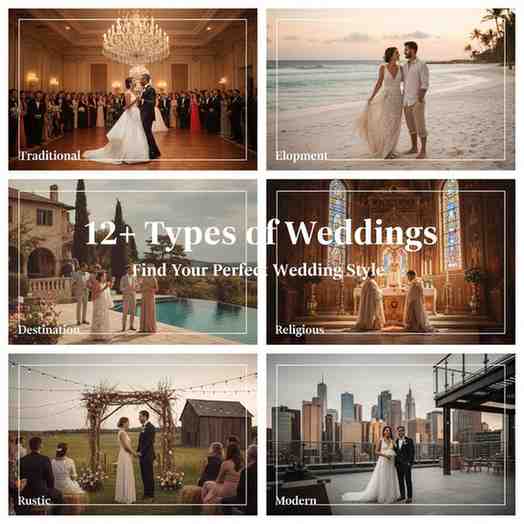What Different Types of Weddings Are There?
-
Traditional Weddings150-200 guests | Ceremony + reception format | Average $30,000-$50,000 budget
-
Destination Weddings30-100 guests | Away from home | Often multi-day celebrations
-
Elopements2-10 people | Intimate & spontaneous | 60-90% lower costs
-
Religious & Interfaith CeremoniesFaith-based or blending multiple traditions | Requires premarital counseling
Answers Tailored to Your Needs
Supporting Evidence & Data
Frequently Asked Questions
What's the most affordable type of wedding?
The most affordable wedding types are typically courthouse or civil ceremonies, which can cost as little as $50-$500 for the license and officiant fees. Backyard weddings and elopements are also budget-friendly options, often ranging from $1,000-$5,000. These intimate celebrations allow couples to focus on what matters most while significantly reducing venue, catering, and decoration costs.
How many guests attend different types of weddings?
Guest counts vary significantly by wedding type. Elopements typically include just the couple or 2-10 people. Intimate weddings host 10-50 guests, while traditional weddings average 100-150 guests. Large formal weddings can accommodate 150-300+ guests. Micro weddings, which have grown in popularity, usually include 20-50 close friends and family members, offering a middle ground between intimacy and celebration.
What's the difference between civil and religious ceremonies?
Civil ceremonies are secular, legal marriages performed by government officials like judges, justices of the peace, or authorized civil officiants. They focus on the legal contract of marriage without religious elements. Religious ceremonies incorporate faith-based traditions, prayers, and blessings, and are conducted by clergy members in houses of worship or other venues. Religious ceremonies often require pre-marital counseling and adherence to specific religious traditions and requirements.
Can you have a destination wedding in the USA?
Absolutely! Destination weddings within the USA are very popular. Popular domestic destinations include Hawaii, California wine country, Colorado mountain resorts, Charleston and Savannah in the South, the Florida Keys, national parks, and major cities like New York or Las Vegas. These offer the excitement of a destination wedding while simplifying legal requirements and making travel easier for American guests. They typically cost less than international destinations while still providing a special, memorable experience.
What are the most popular wedding types in 2025?
In 2025, couples are gravitating toward micro weddings (20-50 guests), which offer intimacy without sacrificing celebration. Outdoor and nature-focused weddings remain trendy, including garden, barn, and vineyard venues. Sustainable and eco-conscious weddings are increasingly popular, along with personalized, non-traditional ceremonies that reflect the couple's unique story. Weekend wedding experiences, where celebrations span multiple days with various events, are also gaining traction among couples wanting to maximize time with loved ones.
How long does planning each wedding type take?
Planning timelines vary by wedding complexity. Elopements and courthouse weddings can be planned in as little as a few weeks to 2-3 months. Micro and intimate weddings typically need 3-6 months of planning. Traditional weddings generally require 9-12 months, while elaborate formal or destination weddings often need 12-18 months to secure venues, coordinate travel, and finalize details. However, with the right team and flexible expectations, any wedding type can be planned more quickly if needed.


3 comments
For sxmb minh ngoc, this website rocks! The interface is user-friendly. I can quickly find the data I need. Let me know if anyone wins big!. Stats available on this page: sxmb minh ngoc
Just got the Playtime app! Casino games are my jam. Downloading it now, fingers crossed for some big wins! Check it out here: playtime app casino download
I check xsmb minh ngoc hang ngay without fail using this site. It’s part of my daily routine. Always hoping for that winning number. Good luck!. Check everyday results: xsmb minh ngoc hang ngay